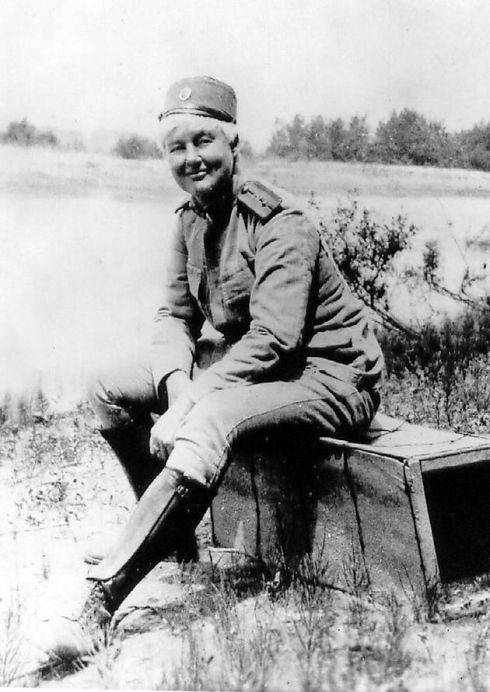Flora Sandes: Difference between revisions
No edit summary |
No edit summary |
||
| Line 1: | Line 1: | ||
[[File:Flora_Sandes_in_uniform.jpg|thumb|Flora Sandes c. 1918]] |
[[File:Flora_Sandes_in_uniform.jpg|thumb|Flora Sandes c. 1918]] |
||
Flora Sandes (22 January 1876 – 24 November 1956) was a British woman who served as a member of the Royal Serbian Army in World War I. She was the only British woman officially to serve as a soldier in that war. Initially a St. John Ambulance volunteer, she travelled to the Kingdom of Serbia, where she was welcomed and formally enrolled in the Serbian army. She was subsequently promoted to the rank of Sergeant major, and, after the war, to Captain. She was decorated with seven medals. |
[[Flora Sandes]] (22 January 1876 – 24 November 1956) was a British woman who served as a member of the Royal Serbian Army in World War I. She was the only British woman officially to serve as a soldier in that war. Initially a St. John Ambulance volunteer, she travelled to the Kingdom of Serbia, where she was welcomed and formally enrolled in the Serbian army. She was subsequently promoted to the rank of Sergeant major, and, after the war, to Captain. She was decorated with seven medals. |
||
In May 1927, Sandes married Yuri Yudenitch, a former Russian White Army general officer. The couple lived for a time in France, but afterwards returned to Serbia (which had become part of the Kingdom of Yugoslavia), and settled in Belgrade. Among other jobs, Sandes drove Belgrade's first taxicab. Also in 1927, she published a second autobiography. She lectured extensively on her wartime experiences in the United Kingdom, Australia, New Zealand, France, Canada and the United States. She wore her military uniform while delivering her lectures. |
In May 1927, Sandes married Yuri Yudenitch, a former Russian White Army general officer. The couple lived for a time in France, but afterwards returned to Serbia (which had become part of the Kingdom of Yugoslavia), and settled in Belgrade. Among other jobs, Sandes drove Belgrade's first taxicab. Also in 1927, she published a second autobiography. She lectured extensively on her wartime experiences in the United Kingdom, Australia, New Zealand, France, Canada and the United States. She wore her military uniform while delivering her lectures. |
||
Revision as of 10:55, 28 May 2023

Flora Sandes (22 January 1876 – 24 November 1956) was a British woman who served as a member of the Royal Serbian Army in World War I. She was the only British woman officially to serve as a soldier in that war. Initially a St. John Ambulance volunteer, she travelled to the Kingdom of Serbia, where she was welcomed and formally enrolled in the Serbian army. She was subsequently promoted to the rank of Sergeant major, and, after the war, to Captain. She was decorated with seven medals.
In May 1927, Sandes married Yuri Yudenitch, a former Russian White Army general officer. The couple lived for a time in France, but afterwards returned to Serbia (which had become part of the Kingdom of Yugoslavia), and settled in Belgrade. Among other jobs, Sandes drove Belgrade's first taxicab. Also in 1927, she published a second autobiography. She lectured extensively on her wartime experiences in the United Kingdom, Australia, New Zealand, France, Canada and the United States. She wore her military uniform while delivering her lectures.
When during World War II Germany launched its attack on Yugoslavia in April 1941, Sandes and Yudenitch were recalled to military service, but the invasion was over before they could take up any military duties. They were briefly interned by the Germans, before being released on parole. Yudenitch fell ill, was removed to hospital, and died there in September 1941.
Sandes subsequently returned to England. She spent the last years of her life in Suffolk, living at Lower Hacheston near Wickham Market. She died at the East Suffolk and Ipswich Hospital on 24 November 1956: she was cremated at Ipswich Crematorium and her ashes scattered in the Garden of Remembrance. In St Andrew's Church in Marlesford a memorial plaque on the south wall in the choir stalls is dedicated to her.